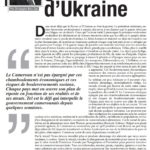Articles 31 to 35 of the Basic Texts, and Articles 80 to 87 of the Bylaws of the CPDM party treat issues related to discipline.
On March 14, 2012, the National President of the CPDM Paul Biya took a decision to render enforceable the basic texts of the CPDM, after the third Ordinary Congress of the CPDM approved its “revision”.
The Basic Texts of the CPDM, fondly referred to as the ‘yellow book’, outlines what constitutes indiscipline – when a party member, according to the Basic Text goes against the aim of the Cameroon People’s Democratic Movement as stated in Article 2. When “competent executive officer of a basic organ fails to hold statutory meetings”, it is a “disciplinary offence,” the Constitution of the party says.
Disciplinary Organs
After explaining what may be a disciplinary offense, the Basic Texts then defines the disciplinary organs, which include (and limited to) the executive of the relevant basic organ sitting as a disciplinary committee, the disciplinary commission set up at the level of the Central Committee and the Political Bureau – one of the three ruling bodies of the CPDM.
The basic text of the party groups sanctions that can be handed down by these organs into two categories. Category II sanctions such dissolution of basic organ, removal from office, temporary expulsion and permanent expulsion can only be decided by a disciplinary commission instituted within the Central Committee. Article 33 insists sanctions such as expulsions and suspensions “shall obligatorily be made public.”
Disciplinary Procedure
At the level of Basic organ of the party – cell, branch, sub section and section, the Constitution of the CPDM says an act likely to be considered a disciplinary offence shall be notified to the disciplinary committee, which is the executive of the organ as stated in Article 32(a).
Then the dispute officer of the organ, according to article 34(b) investigates the matter, tables his findings to the organ for ruling. However, decisions by the executive of basic organs seating as the disciplinary committee are subject to appeal at the organ immediately above. If the ruling is at the level of the subsection, the appeal is tabled to the section executive. Alternatively, the organ may refer its decisions to the disciplinary committee of the Central Committee for a final decision, Article 34 (d) adds.
When you move to the level of the Central Committee of the CPDM, article 34 (2) of the basic texts says “the central Committee may decide that because of the functions exercised by certain members, such members, as far as discipline is concerned, fall under the jurisdiction of the disciplinary commission.” Meaning, for example, a member of party who holds the office of the Section President, because of this function is better grilled by the disciplinary commission of the Central Committee. Else, the section president who commits a disciplinary office will be judge and party due to his influence at the level of basic organs.
At the level of the Political Bureau, only “a serious offence” can take a member to this disciplinary organ, and at the behest of the National President. Expulsion and dissolution of an executive are the only two sanctions expected from this organ when it meets as a disciplinary committee.
The disciplinary procedure within the CPDM is adversarial – this requires the opposing sides to bring out pertinent information and to present and cross –examine witnesses. CPDM also offers the option for the accused to be “assisted by a peer of their choice,” Article 35 of the basic texts concludes on discipline within the ruling party.
Next Step after Sanctions
The by-laws of the party and its specialized organs, from Articles 80 to 87add more notes on the disciplinary procedure within the blazing torch party. Here, the by-laws of the party roll out specific actions to be taken when sanctions are meted out. Article 80(2) (a), for example, says, “in case of suspension, the decision, notwithstanding appeal, shall be immediately enforceable”. While Article 80(3) gives powers to the political bureau to designate an acting executive where one is dissolved.
Furthering, Article 84 outlines the composition of the disciplinary commission of the Central Committee, and says it has “16 members elected by the Central Committee on the proposal of the National President”. Besides the three disciplinary committees cited, Article 87 gives room for the Central Committee to “either pronounce penalties directly or to refer offenders to its disciplinary commission or to a basic organ of the Party.”
All Is Not Lost
Although Article 34(2) of the Constitution says a decision taken by the disciplinary committee of the Central Committee “shall not be subject to any appeal”, the Bylaws, however, in Article 86 says “it (the disciplinary committee of the Central Committee) may, on the proposal of the National President, rehabilitate a militant who has been sanctioned”.
Jude VIBAN



